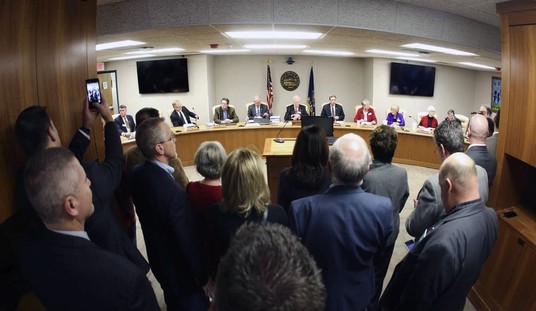One of the few victories for conservatives in the recently held national election occurred in one of the most liberal states of America.
California put together Proposition 8, a state referendum that would amend the state Constitution to define marriage as a union between a man and woman, overturning a recent California Supreme Court decision that recognized same-sex marriage in California as a right. Proposition 8 gave the people of California a democratic way to settle the question of gay marriage instead of allowing the courts to have the final say. The proposition passed by a margin of 52 to 48 percent.
It is possible that the success of the proposition came about because opponents of gay marriage were able to focus the debate beyond the issue of marriage. The “Yes on 8” campaign was effective in creating ads that expanded the debate to include the potential indoctrination of children in public schools to accept homosexual marriage as normal. In the same week that the “No on 8” campaign attacked the ads as lies, a first grade class took a school-sponsored field trip to their teacher’s gay wedding.
Regardless of why the proposition was a success, the decision by voters sparked outrage from gay-marriage supporters, causing some to react in rage and violence. The American Civil Liberties Union and other legal groups are threatening a lawsuit challenging the proposition.
The ACLU filed a petition with the California Supreme Court, urging that the justices invalidate Proposition 8 because the initiative process was “improperly used in an attempt to undo the constitution’s core commitment to equality for everyone,” because it discriminated against gays and lesbians. They also claim that the initiative improperly prevents the courts from exercising “their essential constitutional role of protecting the equal protection rights of minorities.”
They explain:
The California Constitution itself sets out two ways to alter the document that sets the most basic rules about how state government works. Through the initiative process, voters can make relatively small changes to the constitution. But any measure that would change the underlying principles of the constitution must first be approved by the legislature before being submitted to the voters. That didn’t happen with Proposition 8, and that’s why it’s invalid.
Constitutional scholar Eugene Volokh finds a flaw in the ACLU argument. He points out under the California Constitution, the initiative can be used for “amendments” but not “revisions.” He concludes the proposal is likely to be found as an amendment.
The proposal to allow only opposite-sex marriages is likely to be found to be only an amendment, not a revision. Raven struck down an initiative that would bar the state courts from interpreting the state constitution in a more defendant-friendly way than the federal constitution is interpreted, as to a wide range of constitutional provisions. (Generally speaking, state prosecutions must comply with both the state constitution’s bill of rights and the federal bill of rights, and while states often interpret state constitutional rights the same way as the U.S. Supreme Court has interpreted the analogous federal right, they also have the power to interpret the state rights more broadly.)
The court stressed that the proposal made “such far reaching changes in the nature of our basic governmental plan as to amount to a revision,” because it “involved a broad attack on state court authority to exercise independent judgment in construing a wide spectrum of important rights under the state Constitution,” as opposed to only dealing with one specific right.
Mr. Volokh points out that the scope of rights that are cut shouldn’t affect the amendment’s constitutional legality, and ultimately the court’s authority is derived from the voters.
One point of the state constitutional amendment process is to make sure that the scope of state constitutional rights is decided by the voters in the state, not just by the seven voters on the state supreme court, especially since those seven voters themselves derive their constitutional authority from a document enacted by a majority vote of the states’ voters.
Law professor Stephen Bainbridge is on the same page with Eugene and points out another stumbling block the ACLU will run into. The argument of amendment versus revision has already been made.
Prop 8 opponents made a pre-election challenge of the proposition’s placement on the ballot on precisely these grounds; namely, that Prop 8 is a revision rather than amendment and therefore can only be effected by the revision process, which required legislative initiation. The California supreme court simply decided not to decide that issue. Now it presumably will have to face it.
Patterico, a legal blogger, agrees on the point of judicial activism versus the will of the people:
The message: lefties can’t always win by doing an end-run around the electorate by way of the courts. If the issue comes up again, it will have to be without the interference of judges who write decisions with one hand, so they can pat themselves on the back with the other hand.
Dale Carpenter finds more nuance in the question of whether the provision amounted to an amendment or a revision:
Now you may disagree that the fundamental right to marry extends to same-sex couples. You may also disagree that sexual orientation classifications are suspect, requiring heightened judicial scrutiny. Both objections are well-grounded, are the majority view in other state court systems, and may well be correct. But the California Supreme Court disagrees with you on both points, as it held in its marriage decision last May. Unless it reverses its decision, the court could take the importance of the right declared and the suspect nature of the discrimination into account when it decides what kind of constitutional change Prop 8 would be.
The California Supreme Court has held that the difference between an amendment and a revision turns on both “quantitative and qualitative” factors, and that “substantial changes in either respect could amount to a revision.” Raven, 52 Cal. 3d at 350 (emphasis added). Thus, even if we thought that Prop 8 affected relatively few constitutional provisions (say, the state’s equal protection and due-process guarantees), changes to these provisions might be regarded as “substantial qualitative” reforms in the content of basic constitutional principles.
While legal bloggers are divided on technical questions raised by this proposition, most agree circumventing the will of the people in favor of the will of the court is an uphill battle. Personally, I think the judicial activism route backfires and hurts the cause of gay rights. Not many are comfortable with yielding power to the courts on such sensitive issues, and having the opinion of a few forced on all. The better and more permanent route to equality is not forcing one’s will on others through judicial fiat, but by changing the minds of the majority. No matter what opinion one has of legal reactions, most agree the reactions of violence are irrational, useless, and counter-productive.









Join the conversation as a VIP Member